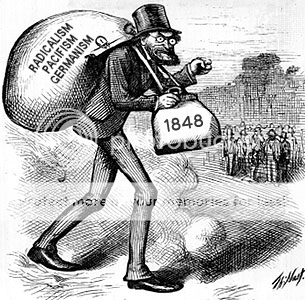BOOK II: Texas, Our Texas
Part 19
That's Right (You're Not from Texas)
Over the years, Texas had become something of a melting pot. Admittedly, it was rather like that melting pot you bought in college and used once before stuffing it into the closet with congealed cheese all over it, but it was a melting pot nonetheless. In addition to the slaves, indians, and Americans, Texas was now home to significant minorities of French, Germans, and an expanded population of Tejanos (and smaller but still notable groups of Czechs, Poles, and others).
German immigration to Texas had met with initial encouragement on most sides, starting with their early forays in the 1830s. Texians liked having more white people around, even if they insisted on gurgling in some foreign devil language. The Germans liked having cheap land they could own themselves, and they considered “moderate to low” an acceptable scalping probability. (Germans and indians actually got along decently well, and Fredericksburg actually signed a treaty with the Comanches that was adhered to by both sides). The German nobles supported it, both because they moved whole communities over to Texas in order to capitalize on the new frontier, and because it was a good escape valve for local crazies. Adelsverein, a noble-backed group to encourage emigration, accomplished the former. The latter accomplished itself.
German immigration first started running into trouble in the late 1840s. While Germans mostly stuck to the Hill Country of central Texas, and the French more to the east, there was still contact between them. The French administrators were not kindly disposed towards Germans. Especially Germans who might take land that French people wanted. Apparently they had had a whole
thing about something like that before.
The French put a lot of money into the Texas government, through trade and otherwise, and so they carried a lot of weight. With pressure from the French and the Texian government, Adelsverein went bankrupt in 1850. But this wasn’t the end of German immigration, just the end of the nobles’ attempt to set up a ‘New Germany’ deep in the heart of Texas.
There was always a trickle of German immigration, but in the years after the Revolutions of 1848, the trickle became a flood. Texas was well established as a favorable emigration destination in Germany, dating back to efforts started by Sam Houston. The Germans who fled the failed revolutions were looking for a place where they could lay low, rebuild their lives, and experiment with their utopian schemes in unclaimed territory. Many of these 48ers would become highly influential members of Texian German society. Though they initially tried to create their own communities - called Latin Settlements due to the founders’ classical education - they soon found that knowledge of Latin, history, poetry, and political science didn’t translate especially well into farming success. Many of these Lateiner ended up trickling into the larger towns and growing cities of the German areas, where they established themselves as teachers, lawyers, and politicians. One German exile, a former revolutionary named Carl Schurz, worked to create a more unified German community in Texas, a peoples’ version of the Adelsverein vision. With his connections to numerous veterans of 1848, Schurz began to forge the region into something more than a connection of scattered settlements.

Carl Schurz in a cartoon from the Houston Star. "Pacifism" is used here with respect to indians.
Muaaaah, the French. The Franco-Texian Treaty provided that 8,000 French families could move to Texas and live tax-free for 25 years, an offer that had been vigorously accepted by thousands. The French settlers were mostly clustered in the east, hugging the coast or the American border (cross-cultural connections between new Texian French and Louisiana Cajuns led to a stronger French political force in Louisiana, and forged one of the few Texian-American ties that stayed strong during the post-Mexican War chill). French winemakers also set up shop in the Texdaho region (the border between Texas and Idaho) and in the Hill Country of central Texas, which created friction between them and the German settlers.
Because their land grants were obviously not settled previously, the French did not have much early access to other Texians, or even to each other. But as their numbers grew, more densely populated settlements were either founded or populated with French. These included the gateway to the American south, Nacogdoches, and the link between deep east Texas and Texdaho, Trinité (Approximately OTL Dallas). Many French also found their way to Houston, which became the first area where French and anglo Texians came into frequent contact.
Such cross-cultural mixings have problems enough generally, and the issues were only exacerbated once the Texians found out their new neighbors didn't have to pay taxes. At the time the Franco-Texian Bill was passed, most Texians had little idea what was going on in the distant capital. Now they were running up against people who were doing the same work as them, but getting a free ride from their own government! And - as is inevitable with any large number of immigrants - certain French floated to the top of their scene and became wealthy, poor Texians were enraged, saying that the French had only succeeded on the backs of the ‘real’ Texians. Amongst working class native Texians in the east, anti-French sentiment began to grow. These people would form the backbone of the eastern section of the Texian Party.
Further south there was less conflict, but only because one side had so thoroughly crushed the others. After the Mexican War, white landowners had managed to secure massive swathes of land in the new territory. Though the never-ending quest for expansion led white ranchers, farmers, cowboys, and merchants over the Rio Grande as well, most of the workers on these vast estates were Tejanos (except the overseers). The new boss being little different than the old boss, poor Tejanos continued right along in the prior existing system of peonage. The largest chunk of land was controlled by Richard King, an investor and riverboat man who settled in Texas after ferrying supplies to the Union army during the Mexican war. He had already built up a sizable estate before the Southron Rebellion, during which he prospered greatly as a member of the Circle of Brothers, smuggling supplies to the Confederate rebels. King’s time in the Circle let him build connections with both the Texian elite and the Confederate power structure. After the war he helped wealthy ex-Confederates set up shop in south Texas, making him a man with many friends, and one who was owed many favors. One particular recent immigrant, who believed his vast wealth would have been destroyed if King had not helped him escape the ashes of the Confederacy, felt particularly indebted to the man. In the years to come there would be a close association and cooperation between the estates of William King and Nathan Bedford Forrest.
The lack of development in the south and the distance from authority made these landowners effectively independent lords of their lands. They were responsible for the creation of the area’s infrastructure, as well as defense, whether from bandits, cattle rustlers, indians, or probing Mexican patrols. King and Forrest in particular were active in this, creating semi-military groups to keep their areas pacified (and to force out smaller farmers so their lands could be seized on the cheap). This was the beginning of the “hacienda system” that would come to dominate the area, with the owners soon earning the title “caudillo”. With south Texas’s congressional delegation entirely controlled by their various patrons, the caudillos soon cemented their hold over the lands to the south.
Hail to the King, baby.
Texas had become a stew of competing interests. The Confederados still strongly supported slavery, and had expanded into Texian farming, cotton, and even light industry. The French worked to secure their place in Texas and grow their economic interests, but were worried about the upcoming expiration of their tax breaks. The Germans were abolitionists who loathed the French, who had deprived them from much of Texas’s economic opportunities or trade, causing an increasingly local focus. Tejanos knew the score, and the caudillos weren't much worse than their old patrons - but they still weren’t happy, and more and more young men began slipping off the haciendas and into bandito groups. And in the middle of it all, the anglo majority was watching what they saw as foreign hordes increasingly carve up their Texas.
Sounds like a good time for an election!


